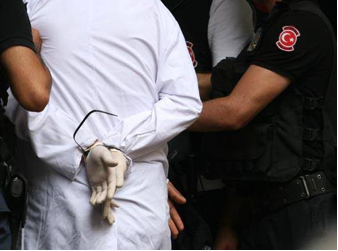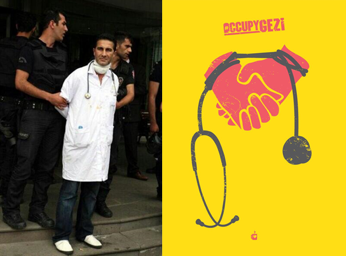This space usually prizes thinking over linking, but with fast-moving events in Brazil and a longer essay (based loosely on this) in the works, here is a round-up of notable links. Criticism, commentary, and reportage are included in both English and Portuguese. All Portuguese excerpts translated by the author.
An interview with João Pedro Stedile of the MST landless workers' movement. [Brasil de Fato]
It's obvious that there is a class war on the street. Although still concentrated in the ideological debate. And what's worse, the very youth mobilized, by their class origin, unaware that they are participating in an ideological struggle. They are doing politics in the best way possible, in the streets. And then they write on posters: we are against parties and politics? That's why the messages on the posters have been so diffuse. It's happening, in every city, in every protest, an ongoing ideological struggle of class interests.
'Saying the unsayable' in Rio. [Julia Michaels, RioReal blog]
Rio lacks sufficient incentives for private real estate developers to help pay for such upgrades, or any kind of low-income or mixed-income housing, specialists say. The right to build is awarded with no social requirements embedded in contracts, as is often the case in other cities, including São Paulo. Implementation difficulties may go beyond funding. When read in light of the events of the last two years — particularly the last two weeks — the program description sounds unrealistic. How indeed, to involve residents in determining priorities and deciding whose homes will give way to needed open spaces?
Dilma's legacy and how it's decided on new versus old media. [Fabio Malini, Labic]
The newspapers possess a journalistic deontology, whose value lies in the problematic "seeing everything from afar." In other words, these [old media Twitter] profiles are not active inside the conversation/demonstration, because they do not create connections. And whoever does not create connections does not have a perspective.
Meeting FIFA deadlines won't take the place of actual urban planning. [Sérgio Magalhães, president of the Institute of Brazilian Architects, Globo op-ed]
Without planning and without transparent priorities, our cities follow the course of impracticality, as much in the quality of urban space as in our non-rendered or poorly-rendered public services.
Tear gas bombs at the stadiums. [Jornal A Nova Democracia]
On 20 June one million people stopped downtown Rio in another protest against misery and the oppression of the Brazilian people. When they reached city hall the action was violently repressed by the military police [PM], who wanted to impede the demonstrators' arrival at Maracanã stadium, where a Confederations Cup game was ongoing. Even journalists and pacifist demonstrators were restrained with tear gas bombs and rubber bullets by the PM.
'Whose order?' An on-the-ground video from 20 June. [Youtube, with English subtitles]
Participatory democracy, until the end. [Gianpaolo Baiocchi and Michael D. Kennedy, Huffington Post]
Many of those in the Workers' Party came to politics through popular struggle. For them to be in the office and not in the streets is fraught with contradiction, and real emotion.
'Ten considerations about the demonstrations' [Débora Prado, Le Monde Diplomatique/Brasil]
We can't forget that the biggest critique of the PT [Workers' Party] is made exactly when it begins to resemble the PSDB [Brazilian Social Democracy Party]. And that we have had the PSDB for decades in state government. And that Mr. Geraldo Alckmim promoted huge privatization of health and education and positioned his police to enact many, many massacres.
Brazil has never had a single revolution. [Social historian Tania Regina de Luca, UOL]
What happened in 1964 was a military coup and not a revolution in Brazil. The same thing in the case of Getúlio Vargas. The emerging changes were in the system of the State and they did not change the political system, for example. We continue [living] in a capitalist country with the same economic system.
The Turkish model: the Brazilian military police acquires high-pressure water tanks to disperse demonstrations. [Extra]
The Turks that went to the streets of Istanbul know well the force of the waterjets and the damage they can cause. In a video on Youtube, a man is shot in the chest and becomes unconscious.
Brazilian television's role in impeding (and later, appropriating) dissent. [Blog do Miro]
The JN criticized an interview given in Rio by a member of the Free Fare Movement, Mayara Vivian. As long as she spoke about buses, everything's fine. But the part where she advocated land reform, political reform, and the end of latifúndio [landed estates] in Brazil was cut by the broadcast censors. These themes are not a part of the [owning] Marinho family brand.
Against impunity for police killings, thousands rally on Avenida Brasil after last week's deaths at the hands of the BOPE (elite command unit of the Brazilian military police). [G1]
There were signs with the names of the dead, alongside messages calling for an end to discrimination against favela dwellers, as well as demanding the right of public safety.
Brazil's musicians on the ongoing mobilization. [Hip-hop musician Emicida, MTV Iggy]
I don’t think ‘the people” – in the sense of working class people – are there representing in a real way. Maybe there are some groups there fighting for the rights of those who don’t have the right to demand anything. Since the movement has grown so much, surely there are some people fighting for the people. But realize this: in the slums, people see the police doing these kinds of things every day, now they’ve just been revealed doing it to a wider slice of society.
I think, to paraphrase Wilson das Neves, “the day the people from the favelas come down to the streets and not for carnival,” it’s going to be civil war. They won’t be protesting with signs saying “less corruption” or anything like that. They’re going to be thinking about how their cousin was murdered by the police the day before, that their home was demolished by the government, about their empty refrigerators and pans. The hungry don’t have any use for dialog, and it would be a mistake to ignore this. So, getting into the question of “is this about the price of the bus” is childish. Of course, the fare hike was the sign that many things are going badly and that we’re not ignoring the rotten intentions of our politicians anymore.
I’m very happy that the youth are taking the streets, but I am afraid that the media is distorting everything and making them out to be villains of some kind. Or worse – using the power of these protests for partisan political purposes.
Privilege, misery, racism, abuse of power, and 'surviving in hell': 'We're organizing.' [Youtube]
http://www.youtube.com/watch?v=wa7n-dUi_ZE
While doctors were overwhelmed, under-equipped, and indignant by the number of injuries flooding their hospitals, the city of Rio managed to find R$4.8 million to install advanced facial recognition systems at public hospitals.
Mea culpa: the president of the Brazilian Parliament gave a ride on board a Brazilian Air Force helicopter to seven companions so they could watch a football match. [Globo]
The 'gay cure' bill is dead. [Reuters]
Opposition to the "gay cure" bill is one of the main issues being taken up by participants in nationwide street protests that began in June over inadequate public services and government corruption.
"Help me, doctor - I woke up gay today!" read the sarcastic sign of one protestor in Rio de Janeiro last month.
Brazil and Turkey's variegated middle class. [Uwe Bott, The Globalist]
In the UNDP's 2013 Human Development Index, Brazil ranked 85th and Turkey 90th out of 186 countries. To put this in perspective, both countries were ranked behind such nations as Azerbaijan, Albania, Ukraine and Venezuela.
South/south models: U.S. bullying of Brazil, still the only BRICS country without a nuclear weapon, was to no avail; the country dealt with its nuclear enrichment capability on its own accord. Iranian sanctions proponents, take note. [Matias Spektor, World Politics Review]
Nine years ago, as chief nuclear negotiator, [Iranian President Hassan] Rouhani compared the controversy around Iran’s pursuit of nuclear technology to that surrounding Brazil’s pursuit of the same technology several decades ago. Once the Brazilians completed their nuclear fuel cycle against the wishes of the West, he said in 2004, “the world started to work with them.” Rouhani’s statement points to the issue of accommodation in the nuclear sphere. As scores of documents and oral history interviews recently released by the Fundacao Getulio Vargas illustrate, in this he was correct: The U.S. accommodated Brazil’s quest for nuclear-energy development to good effect.



